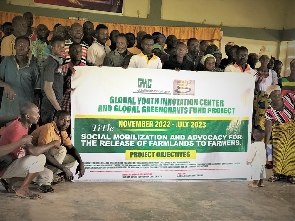 Farmers were engaged by GYIC on how to avoid disputes with land owners
Farmers were engaged by GYIC on how to avoid disputes with land owners
A not-for-profit organisation, Global Youth Innovation Center (GYIC), is on a campaign to ensure that smallholder farmers are not fizzled out into poverty as a result of unfair land acquisition practices.
The organization has flagged with concern, large companies, wealthy businessmen, and politically exposed persons acquiring large tracks of land for plantations and industries in areas occupied by smallholder farmers.
In the Atebubu Amantin Municipality of the Bono East Region, hundreds of farmers mostly settlers from Northern Ghana have lost their farmlands to these wealthy businessmen.
These Usufructs, who grow cassava, maize, yam, beans, and vegetables like cabbage, garden eggs, and pepper have been sacked from their farmlands leaving them in abject poverty.
Sharing his ordeal at a stakeholder mobilisation meeting, a leader in the settler community recounted how he had been rendered jobless and unable to cater for his family and farmhands whom he was brought over from Northern Ghana.
“I saw the chiefs and presented my schnapps and money to use the land for farming but I was told to leave the place because it has been sold to a big investor. I can no longer pay for my children’s school fees or take care of my household. I am now left looking for menial jobs to earn a pittance,” the elderly man lamented.
His situation mirrored the ordeal of several other farmers who had been ejected from their farmlands with little or no compensation in the interest of huge investors planting for exports and cultivating out-grower commercial farms to feed starch factories among others.
Chiefs and land owners at the forum organised by the Global Youth Innovation Center admitted to taking tokens in cash and schnapps to allow them access to the lands but insisted the farmers only held the land in trust.
The farmers who were lucky to be given alternative arable lands complained the plantations spanned such a wide number of hectares, and their new lands were journeys away from their settler homes that were hitherto just a walk to their original farms.
The situation has begun fueling subtle conflicts between investors and the displaced settler farmers, some of whom go to the extent of destroying produce and fruits in the huge plantations to frustrate the investors.
An investor who arrived from the United States of America to purchase huge tracks of land for a mango plantation for exports said she had been compelled in anger to arm herself to protect her boundaries after encountering the disgruntled farmers deliberately punching holes into her mango fruits.
As part of efforts to empower these farmers; GYIC advocated documentation of land tenure agreements between smallholders and traditional authorities who give out parcels of land which become the only source of livelihood for the small farmers.
Dorothy Acheampomaa, the executive coordinator of GYIC, urged all smallholder farmers to document all agreements they enter with chiefs and land owners.
“They must ensure that there is some documentary proof stipulating the number of years they are allowed to farm on the land. This will help them to provide evidence and reduce their vulnerability during takeovers of their farmlands,” she told Ultimate News.
The project, Social Mobilization and Advocacy for the Release of Farmlands to Farmers in the Atebubu Amantin Municipal, funded by the Global Greengrants Fund benefitted some 600 community members and other stakeholders.
These stakeholders would be directly engaged, mobilised, and empowered to effectively craft and communicate persuasive messages to the wider public and media, utilizing social media platforms, and conducting press conferences as a unified and powerful community movement.
To secure the livelihoods of these farmers and ultimately protect the food security and economic development of the country, GYIC is working with the relevant stakeholders to release untapped concessions for smallholder farmers for various agricultural purposes.